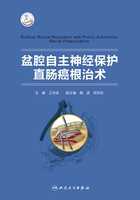
上QQ阅读APP看书,第一时间看更新
序 一(原文)
Rectal cancer is one of the most common malignant tumors of the digestive tract, and more than 600,000 new cases are diagnosed all over the world each year. Although in recent years, the incidence of colorectal cancer(CRC)showed a right-shifting trend in China, but rectal cancer still takes a greatproportion. Epidemiology of rectal cancer also presents another two important features in China: 1)low rectal cancer holds about 65% to 75%, 2)young patients account for a high proportion, and 10%~15% were under 30 years old.
The prognosis of rectal cancer is relatively good, the 5-year overall survival rate is more than 60%after radical resection, and almost 80%~90% in early rectal cancer. Therefore, besides the radical resection, more and more surgical experts begin to pay attention to postoperative quality of life issues of rectal cancer(especially in middle and low rectal cancer patients). In recent years,the application of stapling apparatus saves many patients with low rectal cancer from an artif i cial anus, which formerly required a stoma, thus greatly improving the quality of life after surgery.With the gradual increase in the rate of anal preservation, another postoperative complication became more noticed, that is, urinary and sexual dysfunction.
In early 1980s, the Japanese scholar Tsuchiya carried out pelvic autonomic nerve preservation(PANP)during rectal cancer surgery, and popularized this in Japan. However,PANP still has high incidence of postoperative urinary and sexual dysfunction, and 33%~38%of patients with voiding dysfunction, 32%~39% with erectile dysfunction, 26%~44% with ejaculatory dysfunction after PANP according to the reports. With the development of minimally invasive surgery, laparoscopic radical proctectomy has now accumulated high level evidence.Can we get a breakthrough improvement in pelvic autonomic nerve preservation through the ref i nement effect of laparoscopic surgery?
By updating of anatomical knowledge, especially the full-understanding of Denonvilliers fascia, can we find a better anterior surgical plane? Such a high rate of urinary and sexual dysfunction after operation from rectal cancer demands improvement in the quality of life for these patients? Through this book, we seek to give some practical suggestions. The book focuses on pelvic autonomic nerve preservation during rectal cancer surgery, including the applied anatomy of pelvic autonomic nerve, injury prevention and treatment, and other related knowledge. The author has worked in anatomic and clinical research of PANP for many years.And this book, as the crystallization of collective wisdom, brings together basic research and operation experience of the editorial team.
It is characterized by both theory and practice with systematic and practical content, to clarify the value of neural protection from anatomic theory, to introduce PANP skills from surgical practice. The book has 21 chapters, more than 300,000 words, including 300 illustrations.I am pleased to write this preface for this forthcoming book and recommend it to general surgeons.

2017年3月